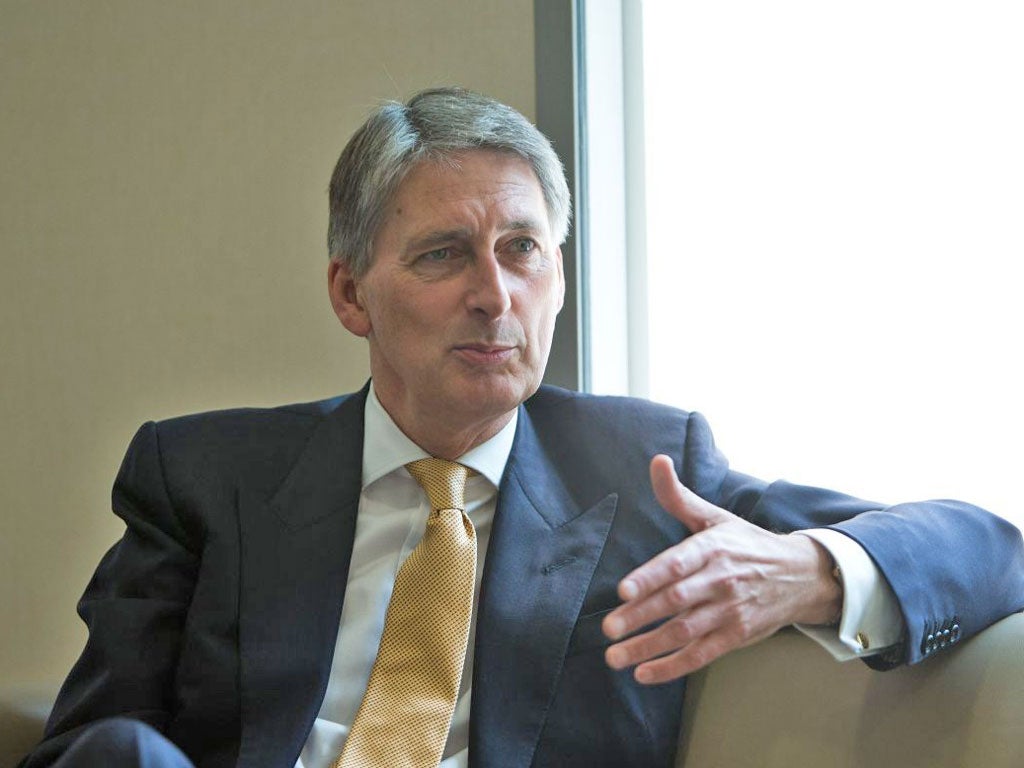Downing Street stresses gay marriage is 'free vote' issue after minister Philip Hammond says there is 'a real sense of anger' over Government's 'redefinition of an institution'
There is no great demand for gay marriage but plans have caused widespread upset, according to the Defence Secretary

Your support helps us to tell the story
From reproductive rights to climate change to Big Tech, The Independent is on the ground when the story is developing. Whether it's investigating the financials of Elon Musk's pro-Trump PAC or producing our latest documentary, 'The A Word', which shines a light on the American women fighting for reproductive rights, we know how important it is to parse out the facts from the messaging.
At such a critical moment in US history, we need reporters on the ground. Your donation allows us to keep sending journalists to speak to both sides of the story.
The Independent is trusted by Americans across the entire political spectrum. And unlike many other quality news outlets, we choose not to lock Americans out of our reporting and analysis with paywalls. We believe quality journalism should be available to everyone, paid for by those who can afford it.
Your support makes all the difference.David Cameron's plans for same-sex marriage have unnecessarily upset "vast numbers of people", Defence Secretary Philip Hammond has said.
Mr Hammond said there was a "real sense of anger" among voters over the Government's legislation to allow gay weddings.
Today Downing Street stressed that gay marriage was a free vote issue. The Prime Minister's official spokesman said: "Individual Members of Parliament will have their views. They have the ability through the free vote to express that.''
Mr Hammond said there was no great demand in the country for change and criticised the amount of parliamentary time which had been devoted to the issue.
" I have just never felt that this is what we should be focusing on," he told BBC1's Question Time.
"This change does redefine marriage. For millions and millions of people who are married, the meaning of marriage changes.
"There is a real sense of anger among many people who are married that any government thinks it has the ability to change the definition of an institution like marriage."
He said the introduction of civil partnerships in 2005 had dealt with the "very real disadvantage" that gay couples faced in the past.
"There was no huge demand for this and we didn't need to spend a lot of parliamentary time and upset vast numbers of people in order to do this," he said.
Mr Hammond's comments echo the concerns of many traditionalist Tory MPs who say the issue is driving supporters away from the party.
But they are likely to irritate the Prime Minister, who has made the change a key symbol of his efforts to modernise the Conservatives.
Equality Minister Maria Miller last night put forward plans for a review on extending civil partnerships to heterosexual couples, in a bid to quell opposition to the Marriage (Same Sex Couples) Bill in the House of Commons.
But under the amendment tabled by Mrs Miller, the review would not take place until five years after gay marriage has been introduced, to allow time for the impact of the new arrangements to be assessed.
The review could pave the way for civil partnerships to be extended, or, if demand has plummeted, scrapped altogether.
The proposal was dismissed today by Conservative former children's minister Tim Loughton as "a spoiling measure from the Government".
Mr Loughton, who has tabled his own amendment for the immediate introduction of straight civil partnerships, told the BBC Radio 4 Today programme: "They should have done this with the Bill."
In a Government consultation on gay marriage, 61% of people said they would like to see civil partnerships extended to heterosexuals, he said.
"They've had the consultation, there's a clear mandate for it, there's a clear majority - as will be shown in an opinion poll this weekend - amongst MPs. Let's get on with it, rather than let it drag on and on."
Mrs Miller has warned that the addition of straight civil partnerships to the current Marriage Bill would significantly delay the introduction of gay marriage and add to the cost of the changes. But Mr Loughton, an opponent of gay marriage, insisted his amendment was "absolutely not" designed to wreck the Bill.
Current proposals will create an inequality between gay couples, who will be able to choose between civil partnership and marriage, and heterosexuals who will only have the option of marriage, he said.
"There are 2.8 million cohabiting couples who don't want to get involved with the whole paraphenalia of marriage but are in a committed relationship and a third of them have children as well," said Mr Loughton.
"I just think we need to give them the option, as gay people now have with the civil partnership - quite rightly - to be able to be in that relationship, to have the rights and responsibilities that go with it as a formal legal recognition and to be able to do that publicly. That's got to be good for stability of families and particularly good for the way we bring up our children. There's a real social need."
The Marriage (Same Sex Couples) Bill returns to MPs on Monday and its passage through parliament is expected to remain bumpy.
It is unlikely that couples will be able to take advantage of any law change until well into next year, with the review of civil partnerships then likely in 2019.
PA
Join our commenting forum
Join thought-provoking conversations, follow other Independent readers and see their replies
Comments